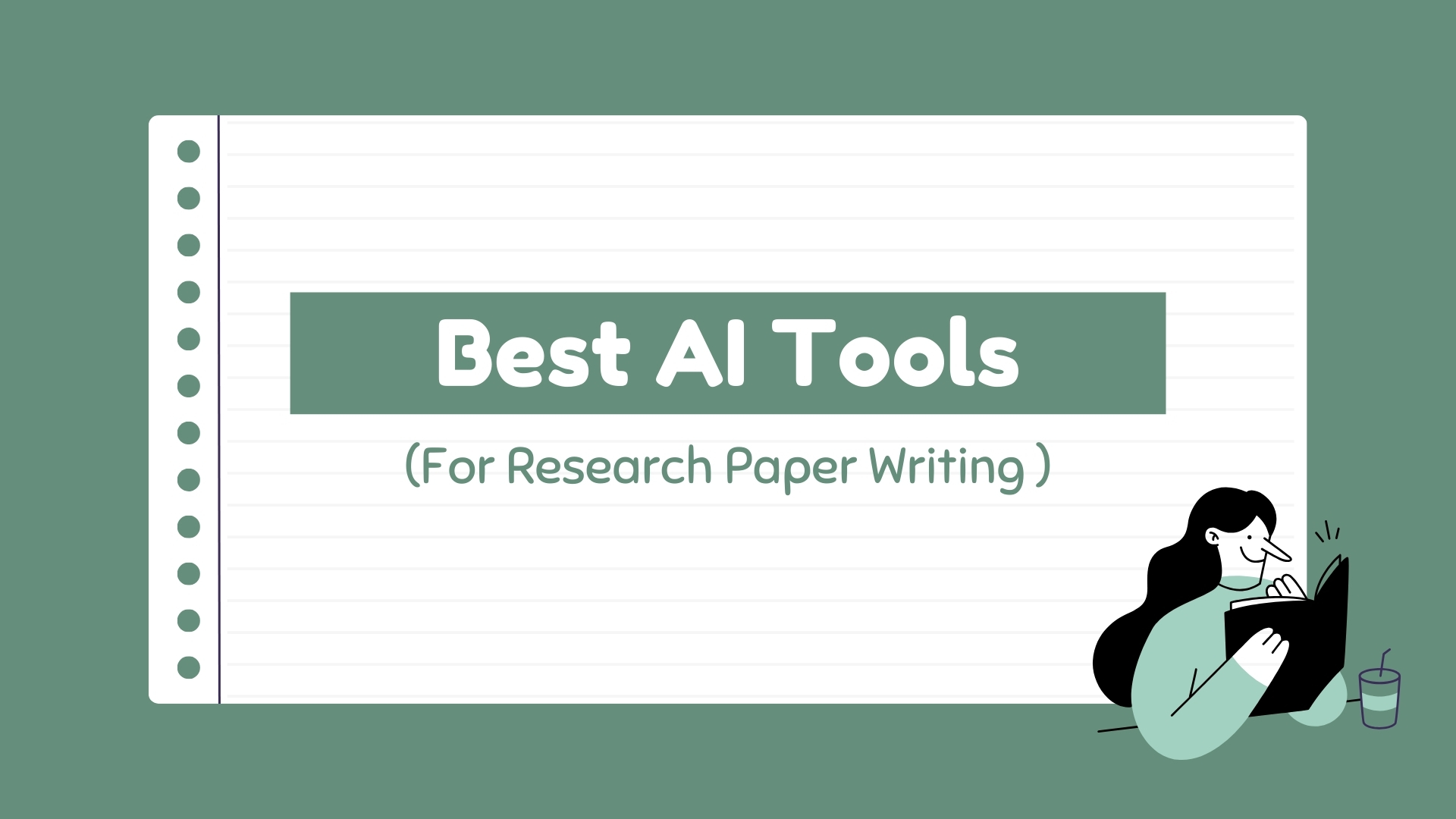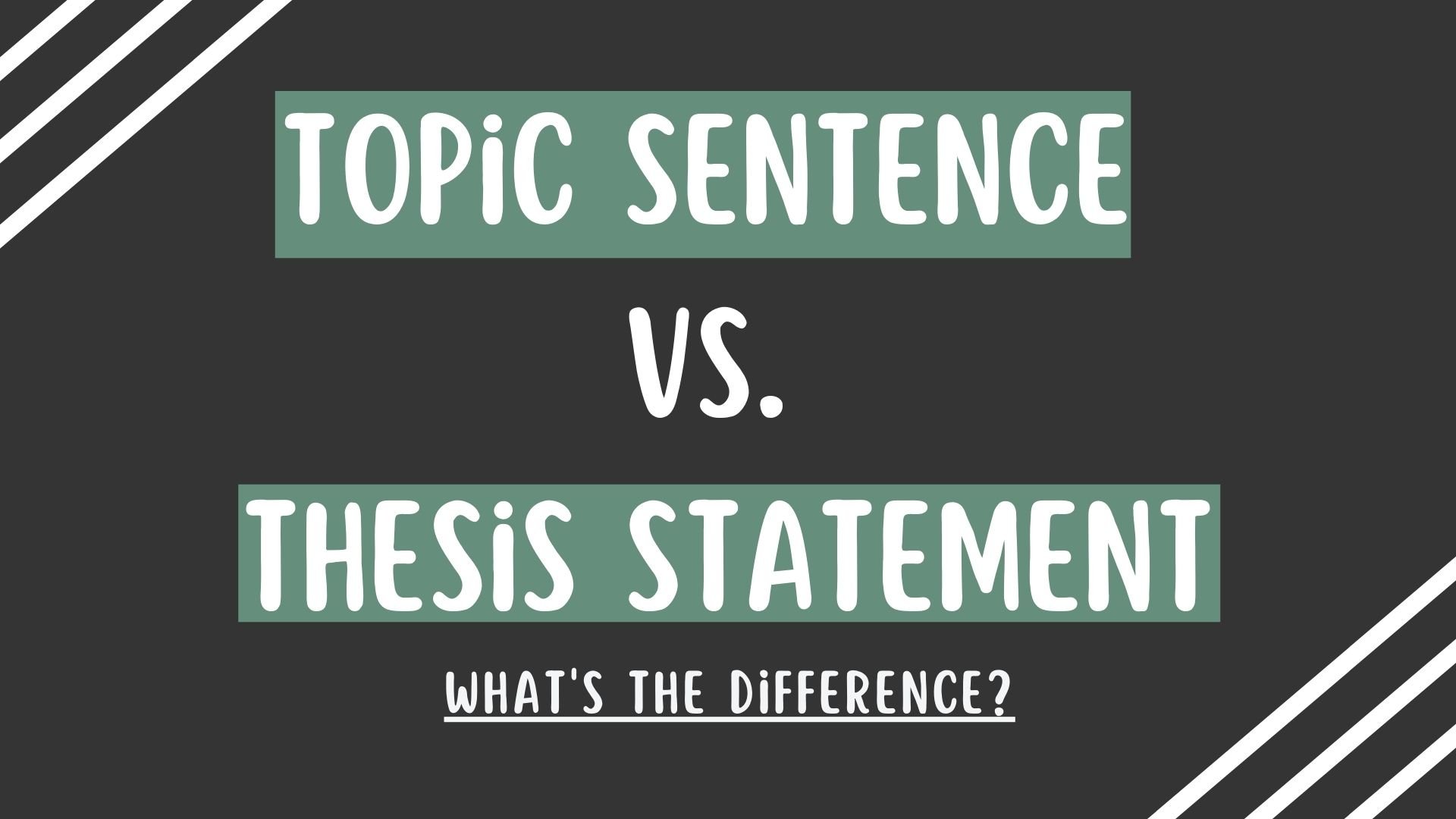Writing a research paper can be a real challenge. But, good news! AI tools that can make it easier. These tools are like having a personal assistant that can help you find information, organize your ideas, and even write your paper.
Our team spent over 142 hours in testing and reviewing several AI tools. In this article I’ll talk about the 12 best AI tools for research paper writing.
I’ll show you which tools are the best and how they can help you. Whether you’re a student or a researcher, I’ll help you find the right tool for you.
These AI tools can help you come up with ideas, organize your thoughts, and even write better. They can make writing a research paper a lot easier and more fun.
Let’s take a look at how they can help you
12 Best AI tools for Research Paper Writing
In this article, we’ll explore 12 AI tools. They can help you find information, summarize what you’ve read, and even give you ideas for what to write.
Here are the 12 best AI tools for research paper writing that we’ll discuss in detail:
- Blainy
- SciSpace
- Otter
- Semantic Scholar
- Consensus
- Scholarcy
- Quillbot
- ResearchRabbit
- Scite.ai
- ProofHub
- ChatGPT
Now, let’s take a closer look at each of these tools. We’ll see what they can do, how they can help you, and what you need to watch out for
Blainy
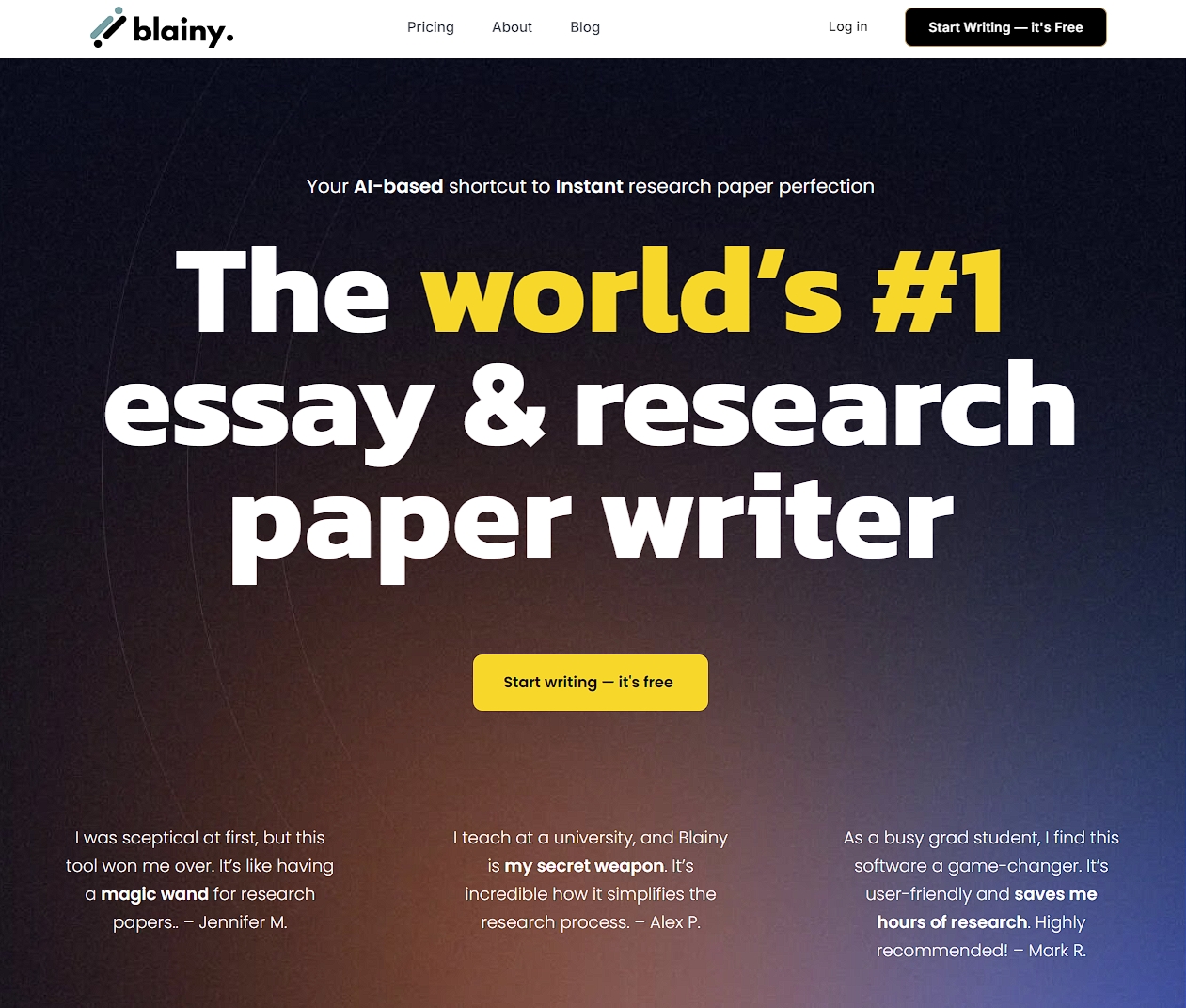
Meet Blainy, an AI tool that help students, researchers, and writers with their essays and papers. Blainy has lots of features that can help with every step of writing, from finding information to making sure your work is perfect.
What makes Blainy special is that it can do more than just help with basic writing. It can also help you make your sentences and paragraphs better, summarize long texts, and even come up with a great thesis statement. This means you can save time and make your work even better.
Here’re some of the features blainy offer:
- AI Essay Writer
- Essay Expander
- Sentence & Paragraph Expansion
- AI Essay Outline Generation
- AI Summarizer
- Paragraph Generator
- Paraphrasing Tool
- Literature Review Generator
- Thesis Statement Generator
Reasons to buy:
- Specialized in academic and research writing
- Comprehensive suite of tools for essay and paper creation
- AI-powered assistance for literature reviews and thesis statements
- In-text citation feature to maintain academic integrity
- Multiple citation styles available
- Ideal for researchers, students, and essay writers
Reasons to avoid:
- Free plan has limitations on AI word generation
- Specialized tool for researchers and article/essay writers
Pricing:
Free Plan: $0/month
- 200 AI words per day
- Basic features include instant research assistance and basic paraphrasing
Unlimited Plan: $12/month
- Unlimited AI words
- Full access to all features
- Priority customer support
Ready to transform your writing experience?
Sign up for Blainy today and start writing your papers with confidence!
SciSpace

SciSpace is a a powerful tool that helps researchers do their job more efficiently. It’s like a personal assistant that makes it easier to find the right information, understand complicated ideas, and organize your thoughts.
SciSpace is special because it can search for information in a smarter way. Instead of just looking for specific words, it tries to understand what you’re really looking for. This means it can find important papers that you might have missed otherwise. Plus, it can summarize long papers into shorter, easier-to-read versions, saving you time and effort.
Imagine having a huge library of scientific papers at your fingertips, and being able to find exactly what you need in just a few clicks. That’s what SciSpace offers. Its advanced search features and AI-powered tools make it an essential resource for anyone doing research.
Reasons to buy:
- Comprehensive platform covering multiple aspects of the research process
- Advanced semantic search for more accurate and relevant results
- AI-generated paper summaries for quick understanding of key points
- Integrated citation management tools
- Collaborative features for team research projects
- Free tier available for basic use
Reasons to avoid:
- Learning curve may be steep for some users due to the wide range of features
- Advanced features require a paid subscription
- May be overwhelming for casual or infrequent researchers
Tool features:
- Semantic search engine
- AI-powered paper summaries
- Citation management
- Collaborative workspaces
- PDF reader with annotation tools
- Literature discovery and recommendations
- Plagiarism checker
- Reference manager
- LaTeX editor for manuscript preparation
Pricing:
- Free tier: Basic access to search and summary features
- Premium plan: $12/month (billed annually) or $20/month (billed monthly)
- Labs & Universities: $8/user/month (paid annually)
Ready to transform your writing experience?
Sign up for Blainy today and start writing your papers with confidence!
Otter
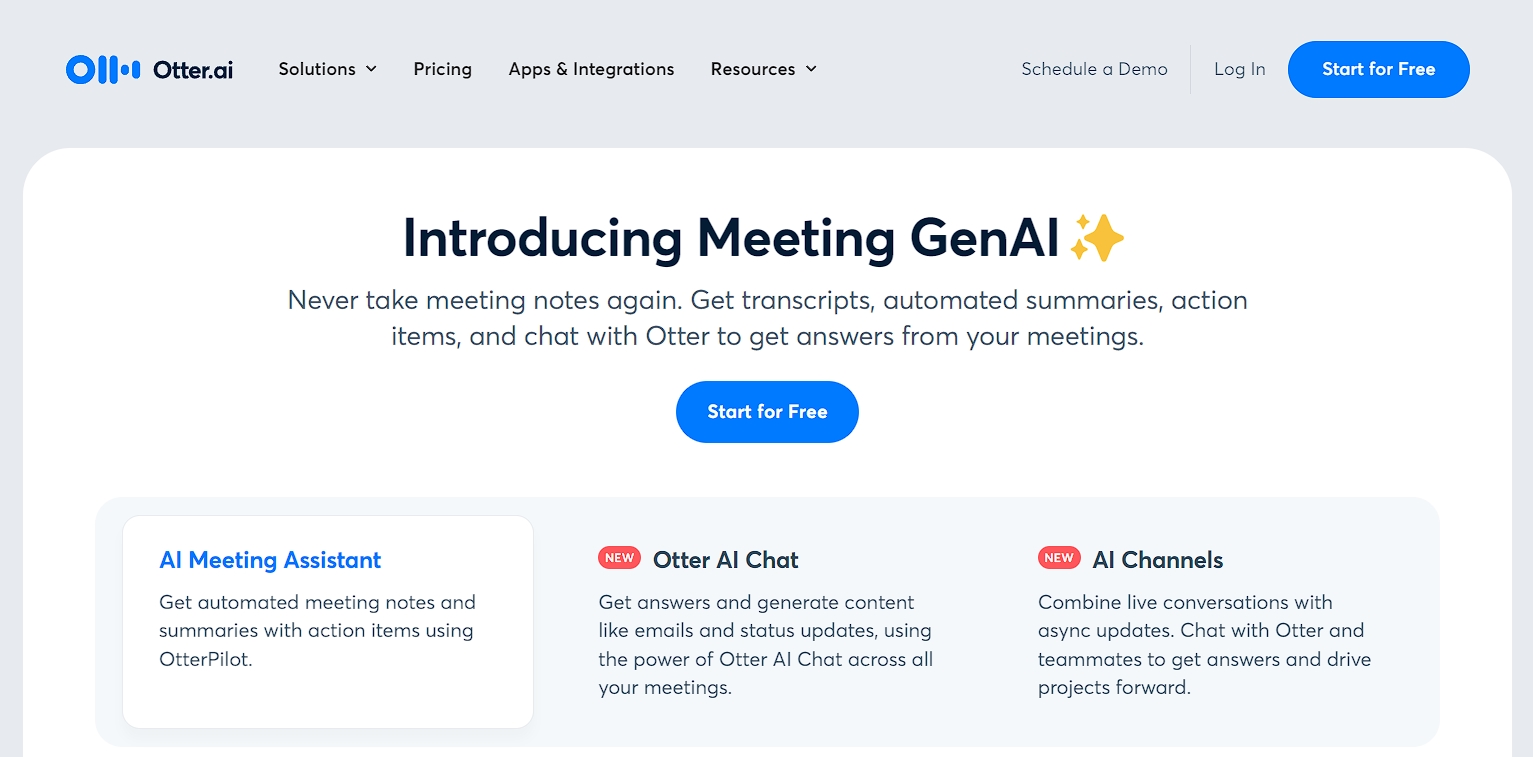
Otter is an AI-powered transcription and note-taking tool . It’s not exclusively designed for reasearchers. However otter can help researchers in various tasks.
One of the best things about Otter is that it can summarize long recordings into shorter, easier-to-read versions. This means you can quickly see the main points without having to listen to the whole thing again. Plus, Otter lets you work with others in real-time, so you can share notes and ideas with your friends or teammates.
Imagine being able to record a lecture or discussion, and then having a written version of what was said right away. That’s what Otter can do. It’s like having a personal note-taker who helps you stay organized and focused.
Reasons to buy:
- Accurate real-time transcription of audio content
- AI-generated summaries of transcribed material
- Collaborative editing and sharing features
- Integration with popular video conferencing platforms
- Mobile app for on-the-go transcription and note-taking
- Searchable archive of transcripts and notes
Reasons to avoid:
- Primary focus is on transcription rather than comprehensive research paper writing
- May require additional tools for other aspects of the research process
- Higher-tier plans can be expensive for individual researchers or students
Tool features:
- Real-time audio transcription
- Automated summary generation
- Speaker identification
- Keyword highlighting
- Collaborative editing and commenting
- Integration with Zoom, Google Meet, and other platforms
- Custom vocabulary for specialized terminology
- Searchable transcript archive
- Export options (including text, PDF, and subtitles)
Pricing:
- Basic Plan: Free (limited to 300 minutes per month)
- Pro Plan: $8.33/month (billed annually) or $16.99/month (billed monthly)
- Business Plan: $20/user/month (billed annually)
- Enterprise Plan: Custom pricing for large organizations
Ready to transform your writing experience?
Sign up for Blainy today and start writing your papers with confidence!
Semantic Scholar
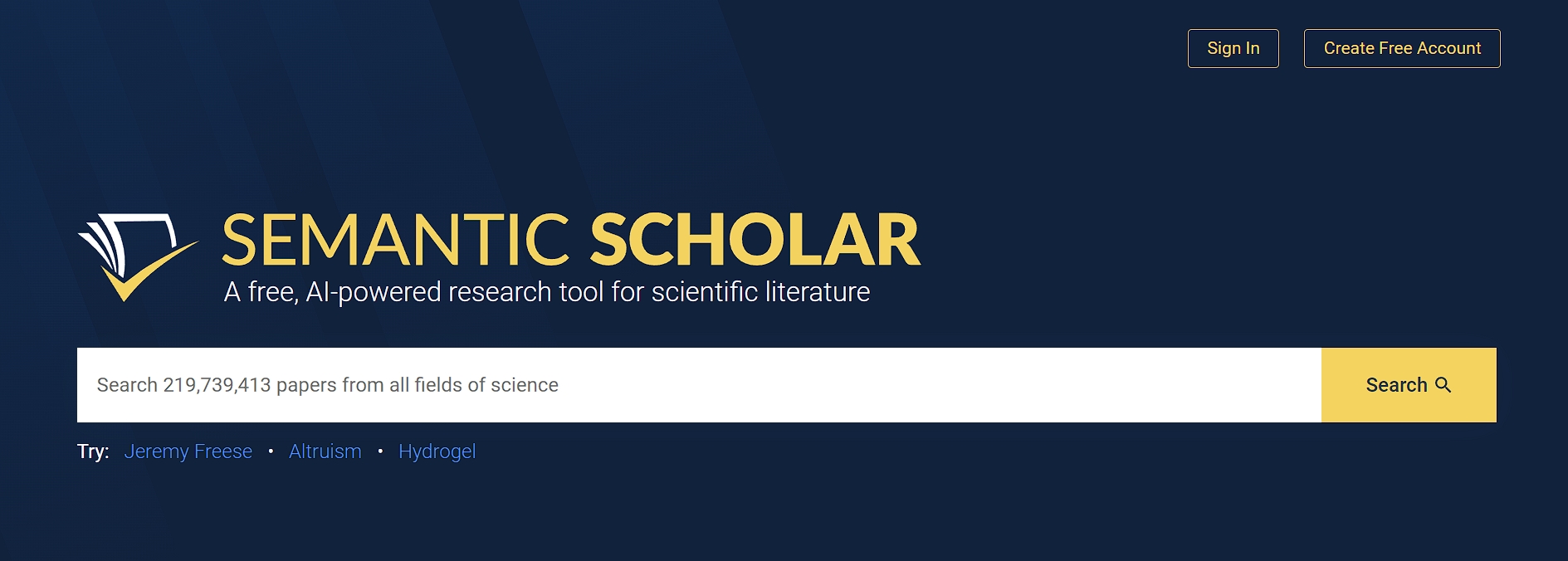
Semantic Scholar helps researchers find the information they need. It uses artificial intelligence to analyze and understand the content of scientific papers. This allows researchers to search for information in a more intelligent and context-aware way, making it easier to find the most relevant research.
What makes Semantic Scholar special is its ability to go beyond simple keyword matching. It uses AI to understand the relationships between papers, authors, and concepts. This provides researchers with a more comprehensive view of their research field. For example, it can help them see which papers are the most important and influential, and who the key experts are in a particular area.
Reasons to buy:
- Advanced AI-powered search capabilities for more relevant results
- Comprehensive coverage of scientific literature across many disciplines
- Integration with open-access repositories
- Free to use for basic research needs
- Provides citation impact and influence metrics
- Offers personalized paper recommendations based on user interests
Reasons to avoid:
- May not cover all niche or specialized publications
- Some advanced features may require registration
- Not a writing tool, focuses primarily on literature discovery and analysis
Tool features:
- AI-driven semantic search
- Citation analysis and impact metrics
- Author profiles and research overviews
- Paper summaries and key figure extraction
- Personalized research feed and recommendations
- Integration with reference management tools
- Mobile app for on-the-go research
- API access for developers and institutions
Pricing:
- Free
Ready to transform your writing experience?
Sign up for Blainy today and start writing your papers with confidence!
Consensus
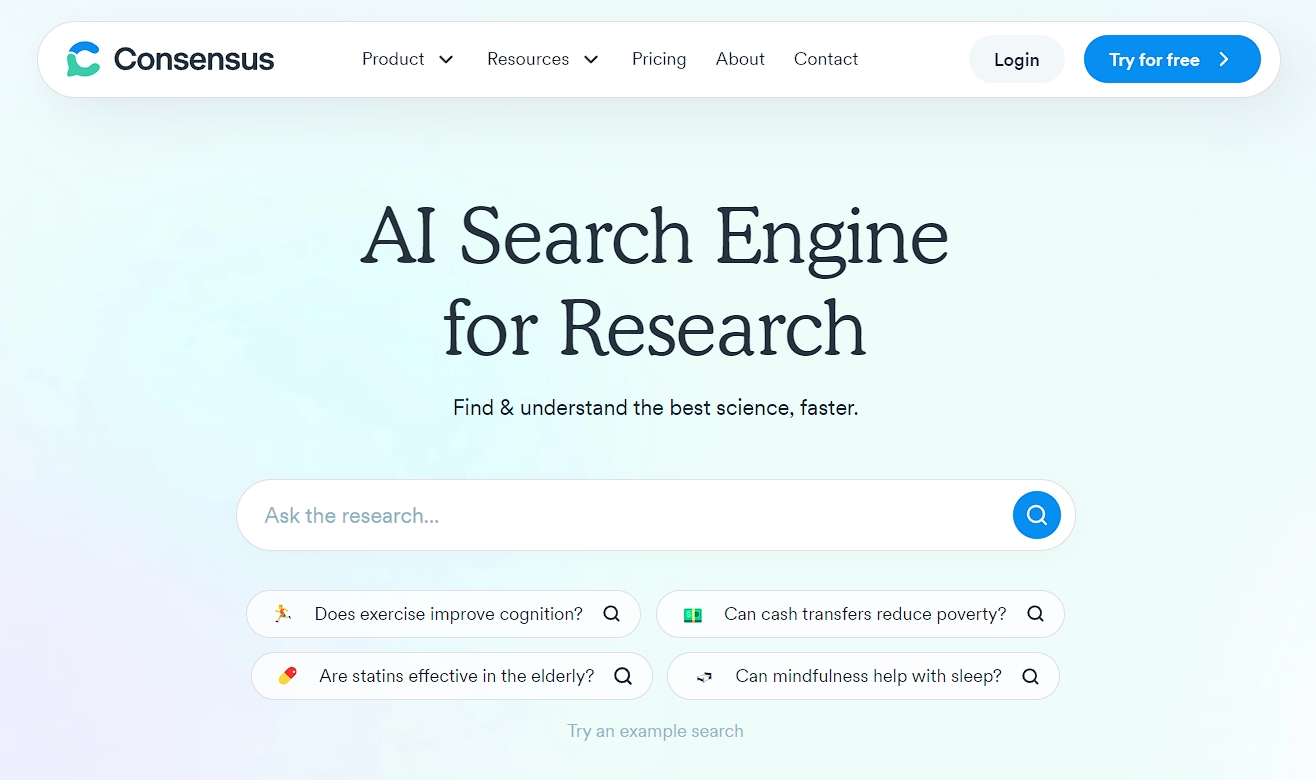
Consensus is a kind of search engine that helps people find answers to scientific questions. It’s different from other search engines because it looks at a huge collection of scientific papers to find the best answers. It generate concise summaries of scientific consensus on specific topics.
One of the cool things about Consensus is that it can understand tricky research questions and find the most relevant answers. It doesn’t just find papers that might be helpful – it also pulls out the most important information and presents it in a way that’s easy to understand. This saves researchers a lot of time because they don’t have to read through tons of papers to find what they’re looking for. Plus, Consensus is transparent about where it gets its information, so users can always check the original papers if they want to learn more.
Reasons to buy:
- Rapidly generates evidence-based summaries on research topics
- Saves time in literature review and information gathering stages
- Provides clear, concise answers to specific research questions
- Offers transparency by linking to original sources
- Helps identify scientific consensus and areas of debate
- Free basic access for individual researchers and students
Reasons to avoid:
- May not cover all niche or highly specialized research areas
- Relies on the quality and comprehensiveness of its underlying database
- Not a writing tool; focuses on information retrieval and synthesis
- Advanced features need a paid subscription
Tool features:
- AI-powered research question answering
- Evidence-based summaries with source citations
- Visualization of scientific consensus
- Integration with reference management tools
- Customizable research feeds
- Collaboration features for team research projects
- API access for developers and institutions
Pricing:
- Free tier: Basic access to search and summary features
- Pro plan: $9.99/month (billed annually) or $11.99/month (billed monthly)
- Team plan: $9.99 per seat/mo (billed annually) or $12.99 per seat/mo (billed monthly)
- Enterprise plan: Custom pricing for large institutions and companies
Ready to transform your writing experience?
Sign up for Blainy today and start writing your papers with confidence!
Elicit
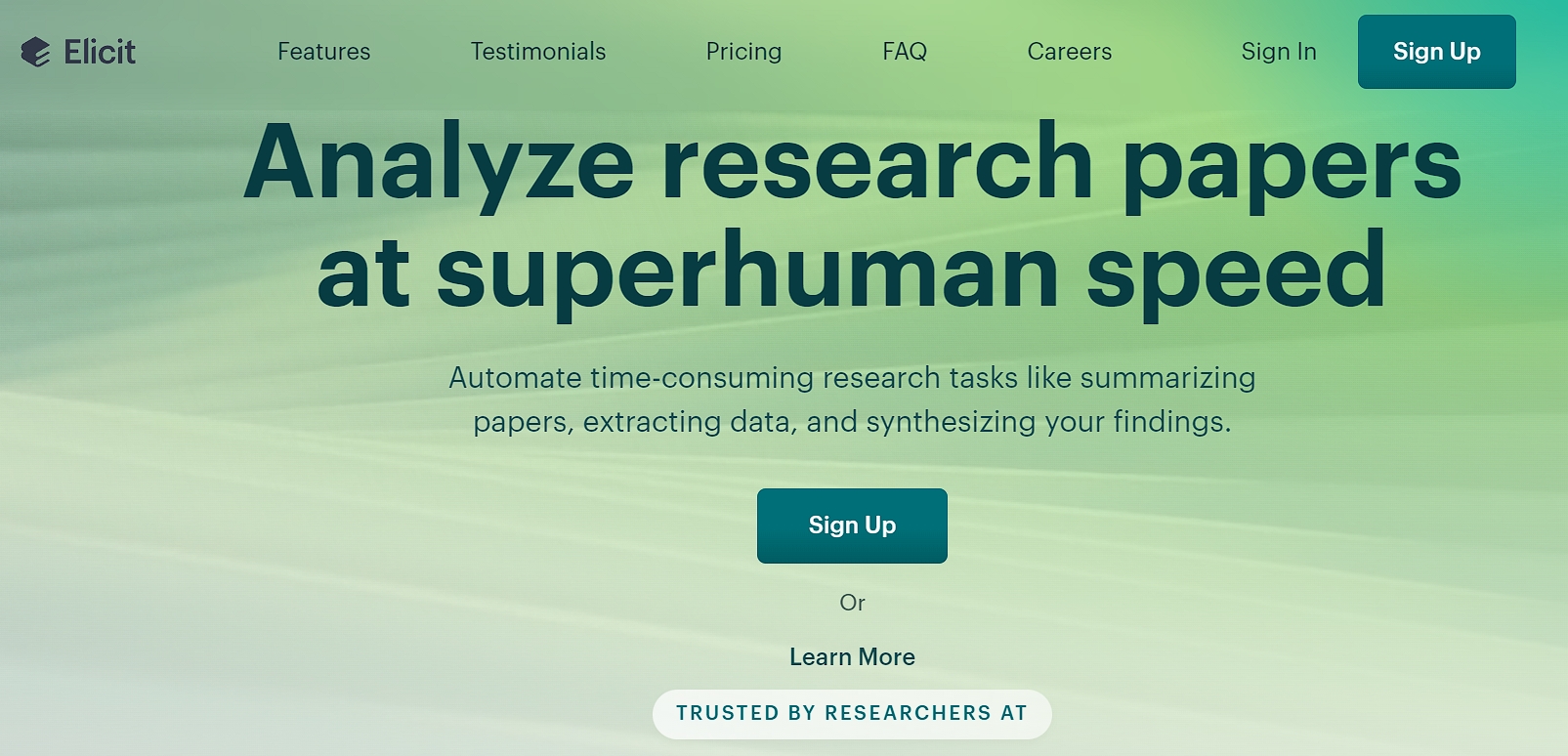
Elicit is an AI tool that makes research easier. It’s like a smart assistant that uses artificial intelligence to help researchers find the information they need. Elicit stands out for its ability to help researchers formulate questions, find relevant papers, and extract key information from scientific literature.
What’s really cool about Elicit is that it can understand what researchers are looking for, even if they don’t ask the question exactly right. It’s like having a super-smart librarian who can find the perfect book for you, even if you don’t know the title. Elicit can also summarize the main points of a research paper, which saves researchers a lot of time. It’s like having a shortcut to the most important information.
Elicit also has a feature that lets users ask specific questions and get answers based on real evidence. It’s like asking a expert a question and getting a trustworthy answer. This makes Elicit really useful for researchers who want to learn more about a specific topic or find out what’s missing in what we already know.
Reasons to buy:
- AI-powered assistance in formulating research questions
- Automated extraction of key information from papers
- Time-saving features for literature review and data extraction
- Question-answering capability based on scientific literature
- Helps identify research gaps and potential new directions
- Free to use for basic research needs
Reasons to avoid:
- May not cover all specialized or niche research areas
- Relies on the quality and comprehensiveness of its underlying database
- Not a comprehensive writing tool; focuses on research assistance
- Some advanced features may require additional training to use effectively
Tool features:
- AI-assisted research question formulation
- Automated literature search and relevance ranking
- Key information extraction (e.g., methods, sample sizes, findings)
- Evidence-based question answering
- Visualization of research landscapes
- Collaboration features for team projects
- Integration with reference management tools
- Customizable research workflows
Pricing:
Free tier: 5000 credits (one-time)
Plus plan: $10 per month (paid annually)
Enterprise plan: Custom pricing for institutions and large research teams
Ready to transform your writing experience?
Sign up for Blainy today and start writing your papers with confidence!
Scholarcy
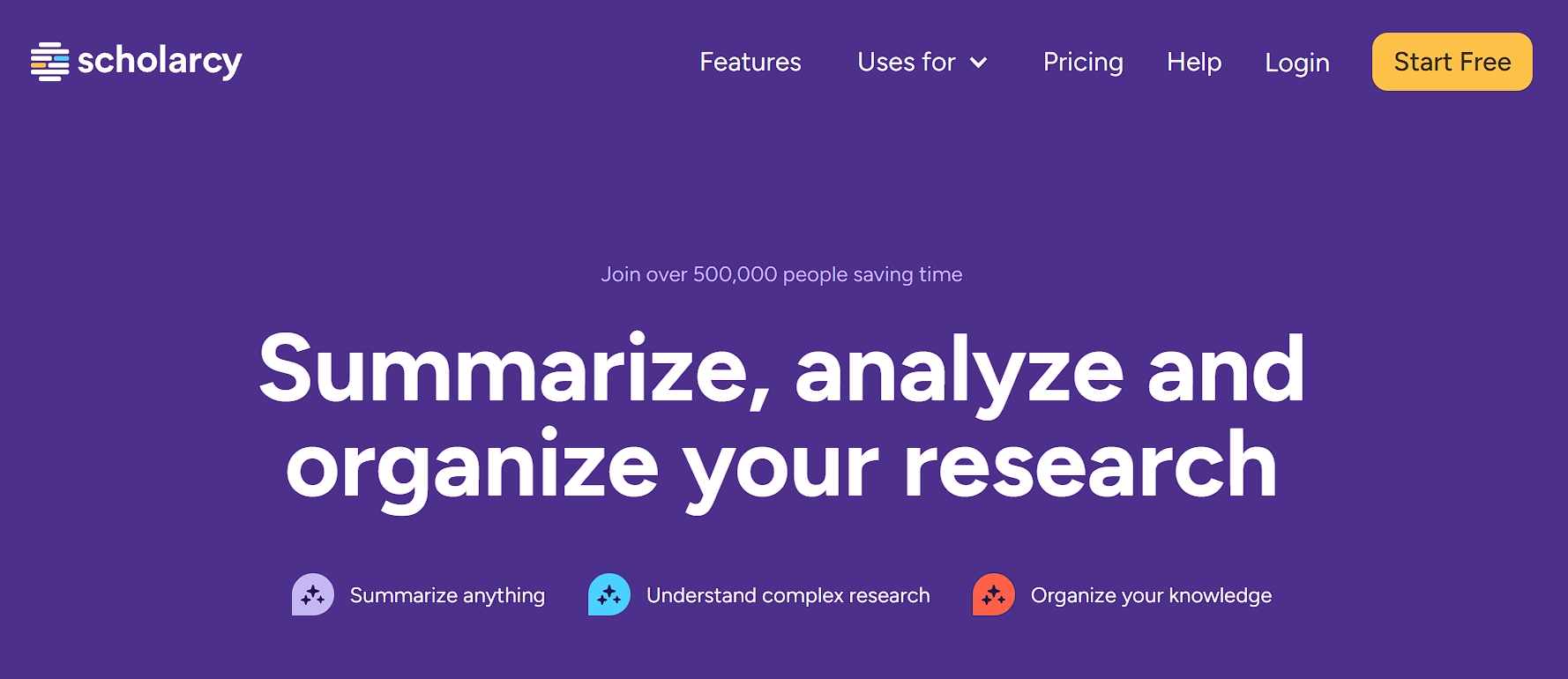
Scholarcy is a helpful tool that makes it easier to understand complicated academic texts. It’s like having a smart friend who reads the text with you and helps you understand the main points. Scholarcy uses NLP* and ML* to summarize long papers and reports, so you can quickly see what’s important.
*(NLP is natural language processing and ML is machine learning)
Scholarcy is good at taking complex ideas and breaking them down into simple, easy-to-understand summaries. It’s like having a cheat sheet that shows you the key points, methods, and conclusions. This is super helpful when you’re doing research and need to read a lot of papers.
One of Scholarcy’s standout features is its ability to create interactive flashcards from academic texts. These flashcards pull out the most important information, like definitions and research questions, and present it in a way that’s easy to review and remember. Scholarcy also has tools that help you organize and understand the text, like creating lists of references and making bibliographies. This makes it easier to understand and remember what you’re reading.
Reasons to buy:
- Rapidly generates concise summaries of academic papers
- Creates interactive flashcards for efficient review and learning
- Automates reference extraction and bibliography generation
- Offers analytical tools for deeper insight into research papers
- Saves significant time in literature review processes
- Integrates with reference management tools
Reasons to avoid:
- May not capture all nuances in highly specialized or technical papers
- Accuracy can vary depending on the complexity of the source material
- Not a writing tool; focuses on analysis and summarization
- Higher-tier plans can be relatively expensive for individual users
Tool features:
- AI-powered document summarization
- Interactive flashcard creation
- Automated reference extraction and citation network visualization
- Bibliography generation in multiple formats
- Integration with reference management software
- Bulk processing capabilities for multiple documents
- Browser extension for easy access while reading online
- API access for developers and institutions
Pricing:
- Free tier: Limited to 3 summaries per day
- Scholarly Plus: $45/year (Annually) or $4.99/month (monthly)
Ready to transform your writing experience?
Sign up for Blainy today and start writing your papers with confidence!
Quillbot
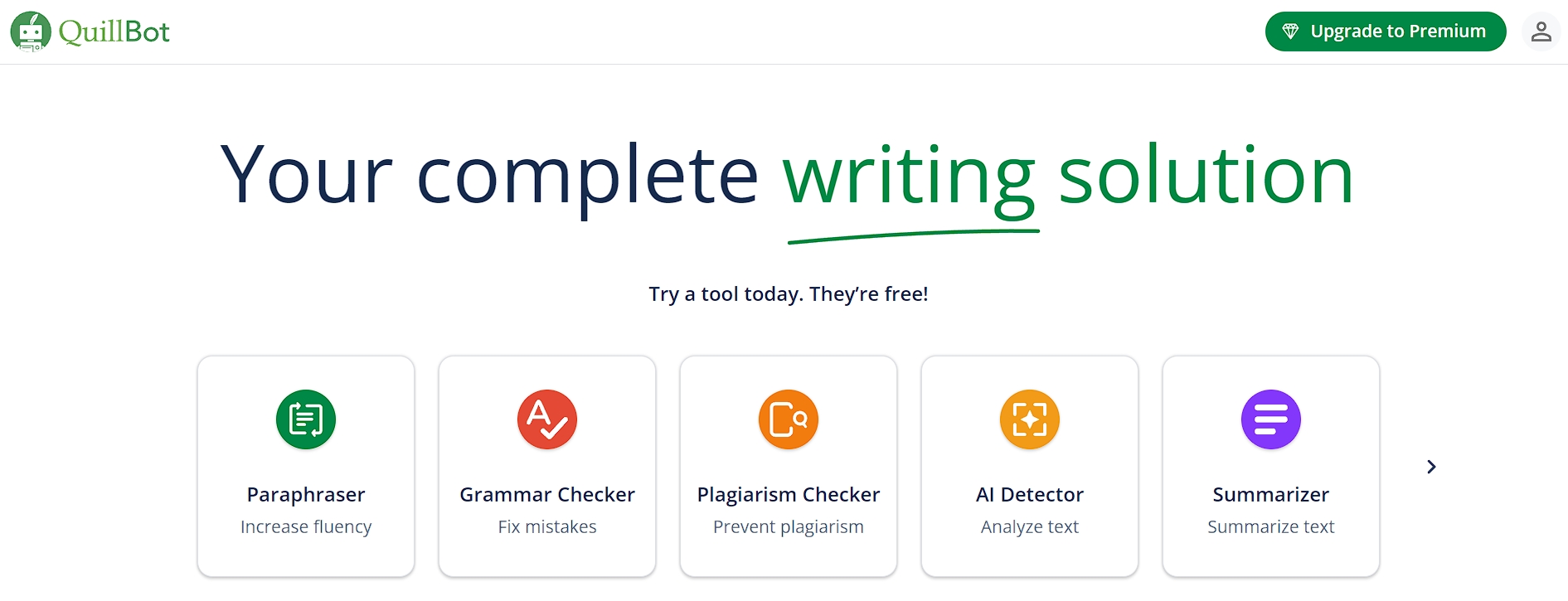
QuillBot makes writing and research easier. It’s can help you with different parts of the writing process. QuillBot is especially good at paraphrasing, while keeping the same meaning.
This is useful for researchers looking to rephrase complex ideas or avoid unintentional plagiarism when referencing sources.
Reasons to buy:
- Powerful paraphrasing tool with multiple modes for different writing styles
- Integrated grammar checker for error-free writing
- Citation generator supports multiple citation styles
- Summarizer tool for quick information extraction
- User-friendly interface suitable for various skill levels
- Chrome extension for easy access while browsing
Reasons to avoid:
- Not specifically designed for academic or research writing
- Paraphrasing tool may oversimplify complex academic concepts if used carelessly
- Free version has limitations on word count and features
- May not be suitable as a standalone tool for comprehensive research paper writing
Tool features:
- AI-powered paraphrasing
- Text summarizer
- Plagiarism checker (in premium plans)
- Chrome extension for easy access
- Co-writer feature for collaborative writing (in premium plans)
- Integration with Microsoft Word (in premium plans)
Pricing:
- Free plan: Limited access to basic features
- Premium plan: $4.17 Per month, billed annually
Ready to transform your writing experience?
Sign up for Blainy today and start writing your papers with confidence!
ResearchRabbit
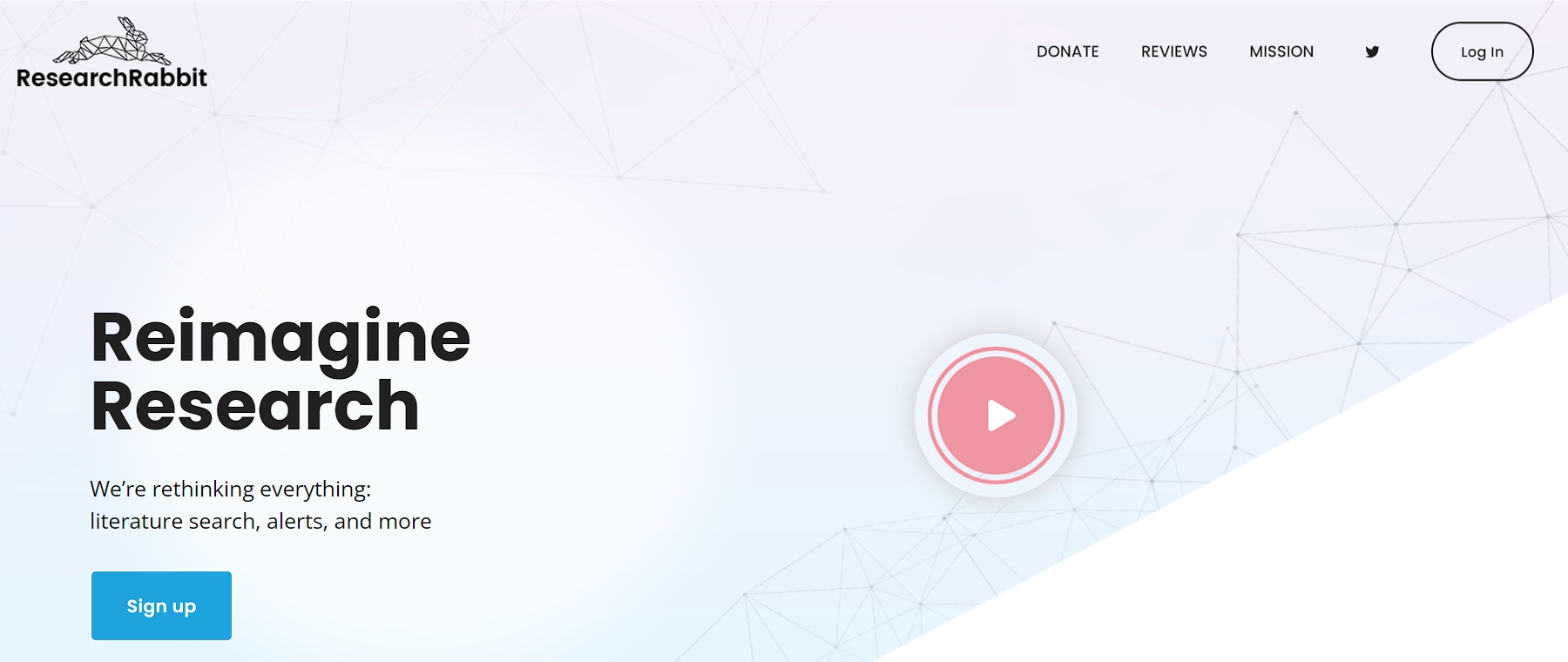
ResearchRabbit makes it easier to find and understand research papers. It’s like a map that shows how different papers are connected, helping you see how ideas have developed over time. ResearchRabbit uses AI to create this map, which makes it easier to find the papers that are most relevant to your research.
What’s really cool about ResearchRabbit is that it can recommend papers that are tailored just for you. It looks at what you’re interested in and what you’ve read before, and then suggests new papers that you might find helpful. As you add more papers to your collection, ResearchRabbit gets better and better at making recommendations. This helps you stay up-to-date with the latest discoveries in your field.
ResearchRabbit also makes it easy to work with others. You can share your collection of papers with your team, and see what they’ve discovered too. This helps you work together more efficiently and makes research more fun
Reasons to buy:
- Visual mapping of research papers for easier navigation of complex topics
- AI-powered paper recommendations tailored to user interests
- Collaboration features for team research projects
- Automated tracking of new papers in specific research areas
- User-friendly interface with intuitive visualization tools
- Free to use for basic research needs
Reasons to avoid:
- May have limitations in very niche or emerging research fields
- Not a comprehensive writing tool; focuses on literature discovery
- Effectiveness depends on the quality and breadth of its underlying database
- Some advanced features may require a learning curve
Tool features:
- Visual research mapping and exploration
- Personalized paper recommendations
- Automated literature tracking and updates
- Collaboration tools for research teams
- Integration with reference management software
- Custom collections and tagging system
- Email alerts for new relevant papers
- Export options for citations and paper lists
Pricing:
- Free
Ready to transform your writing experience?
Sign up for Blainy today and start writing your papers with confidence!
Scite.ai
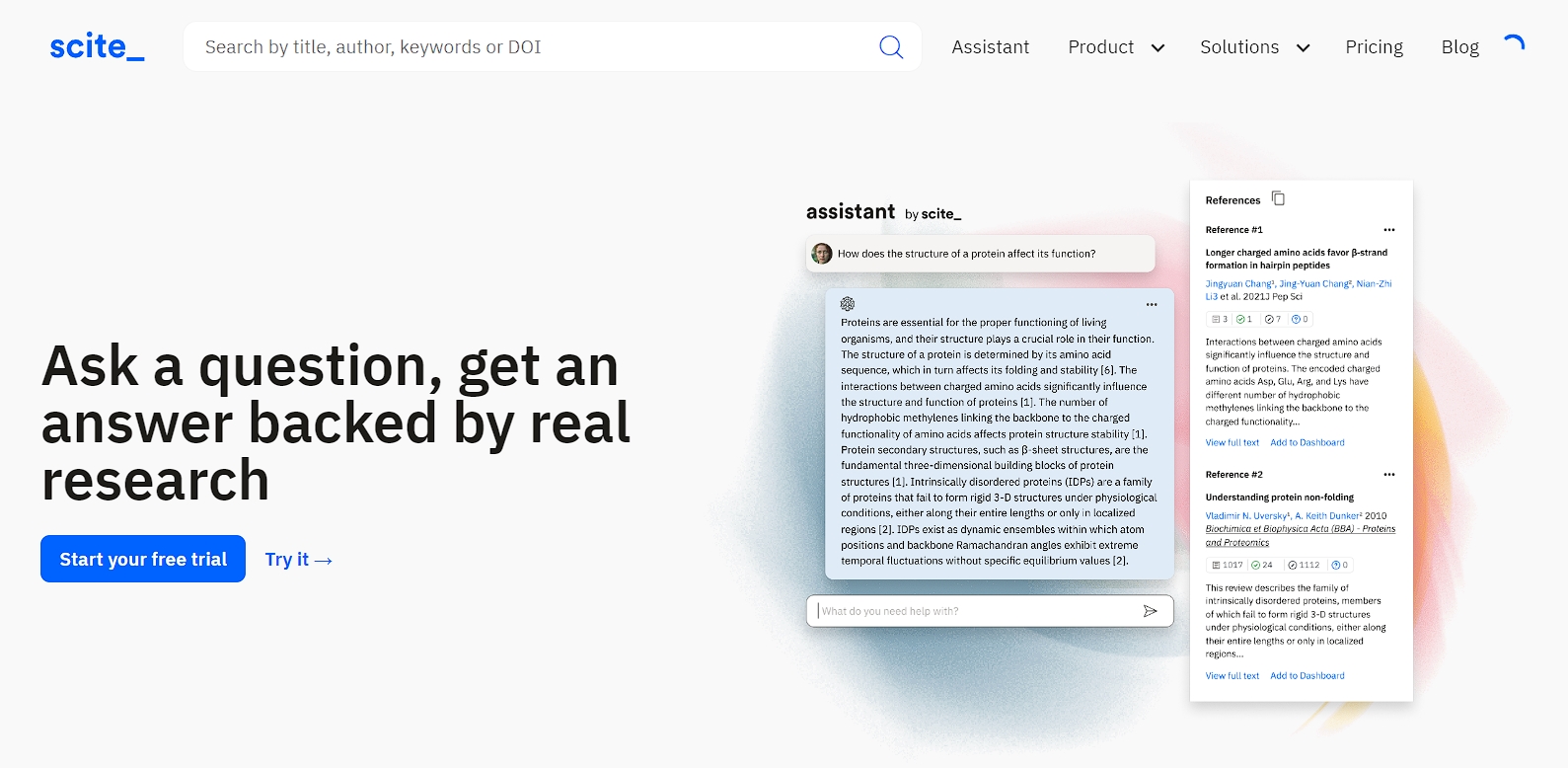
Scite.ai makes it easier for researchers to understand scientific papers. It uses AI to analyze how papers are cited, which means it looks at how other papers refer to them. This helps researchers see how important and reliable a paper is. Scite.ai doesn’t just count how many times a paper is cited, it also looks at what the citing papers say about it. It checks if they agree, disagree, or just mention the paper. This helps researchers quickly figure out if a scientific claim is true or not.
One of the coolest features of Scite.ai is its Smart Citations. These are like a snapshot of how a paper has been cited by other papers. They include short quotes from the citing papers, so you can quickly see why a paper is important without having to read the whole thing. Scite.ai also has tools that help you find related research, track specific papers or topics, and create detailed reports on citations. These features make Scite.ai a really useful tool for researchers who want to stay up-to-date with the latest developments in their field.
Reasons to buy:
- Provides context-rich citation analysis for better understanding of research impact
- Helps quickly identify supporting or contradicting evidence for scientific claims
- Offers powerful search and discovery tools for finding relevant research
- Generates comprehensive citation reports for in-depth analysis
- Integrates with popular reference managers and browser extensions
- Useful for researchers, journal editors, and science journalists
Reasons to avoid:
- Coverage may be limited for very recent publications or niche research areas
- Learning curve associated with interpreting Smart Citations and reports
- Not a writing tool; focuses on research evaluation and discovery
- Some advanced features require a paid subscription
Tool features:
- Smart Citations with context and classification (support, contradict, mention)
- Citation search and discovery tools
- Citation reports and dashboards
- Browser extension for easy access while reading papers online
- Integration with reference management software
- Customizable alerts for tracking papers or topics
- API access for developers and institutions
- Bulk citation checking capabilities
Ready to transform your writing experience?
Sign up for Blainy today and start writing your papers with confidence!
ProofHub
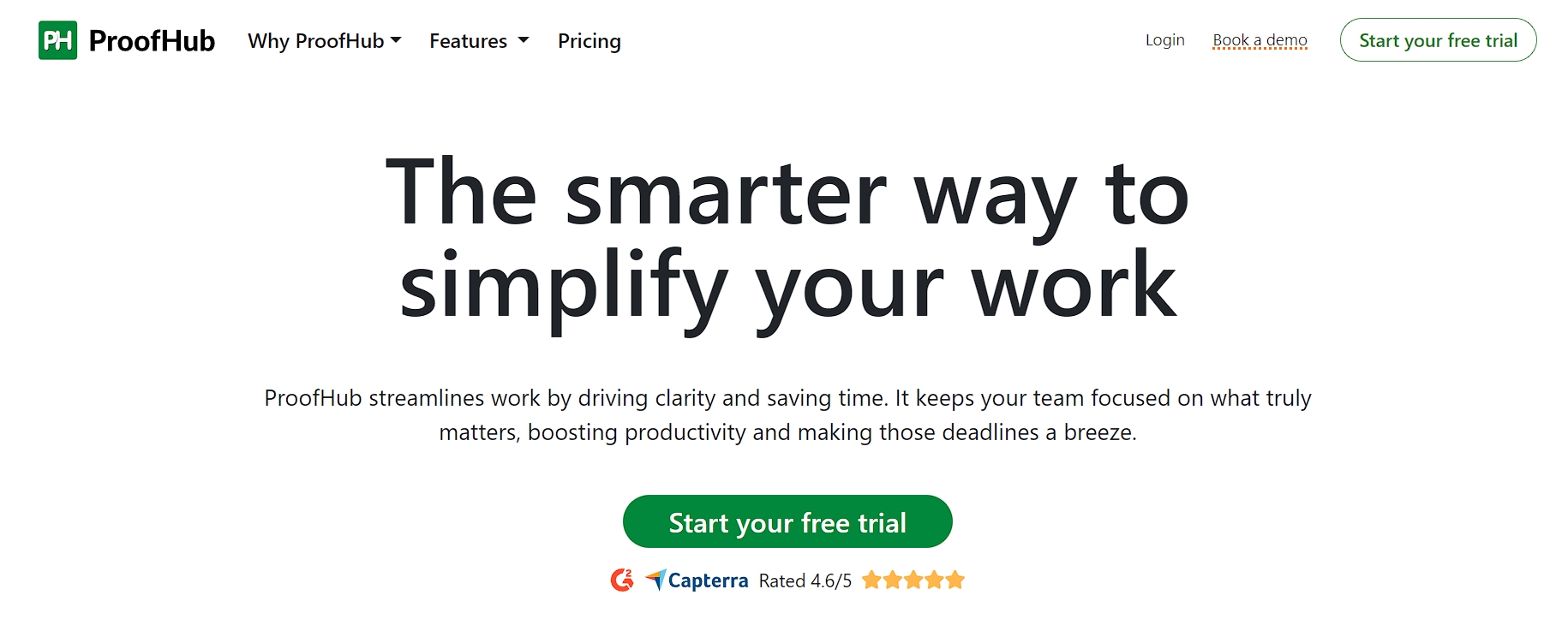
ProofHub makes it easier for teams to work together on research projects. It’s like a central hub where team members can share files, talk to each other, and track their progress. ProofHub is easy to use and allows researchers to create a plan, set deadlines, and assign tasks to team members. This helps teams stay organized and work together more efficiently.
One of the coolest features of ProofHub is its proofing tool. This tool lets team members review and comment on documents right within the platform. It’s like having a virtual meeting where everyone can share their thoughts and ideas. This feature is especially helpful when teams are working together on a research paper.
ProofHub also has tools that help teams track how much time they’re spending on tasks, create charts to visualize their project timeline, and connect with other tools like Google Drive and Dropbox.
While ProofHub isn’t a research assistant, it’s a great tool for helping teams work together and stay organized, which can make the research paper writing process a lot easier.
Reasons to buy:
- Comprehensive project management tools for organizing research projects
- Built-in proofing and review features for collaborative writing
- Customizable workflows to fit specific research processes
- Time tracking capabilities for managing research activities
- Integrations with popular cloud storage and productivity tools
- Suitable for both small research teams and large academic institutions
Reasons to avoid:
- Not specifically designed for academic research or writing
- Lacks AI-powered writing assistance or literature discovery features
- May have more features than necessary for individual researchers
- Learning curve associated with setting up and optimizing workflows
Tool features:
- Task management and assignment
- File sharing and document collaboration
- Proofing and review tools
- Time tracking and timesheets
- Gantt charts and Kanban boards
- Custom workflows and project templates
- Discussion boards and chat functionality
- Calendar and milestone tracking
- Mobile apps for iOS and Android
- API access for custom integrations
Pricing:
- Small Team: 10 users with 40 projects and 10GB storage for $79/month (paid annually) , or $89/month (paid monthly)
- Large Team: 100 users with Unlimited projects and 100GB storage for $139/month (paid annually) or $153/month (paid monthly)
- Large Team Plus: Unlimited users with unlimited projects and 1TB storage for $279/month (paid annually) or $310/month (paid monthly)
Ready to transform your writing experience?
Sign up for Blainy today and start writing your papers with confidence!
ChatGPT
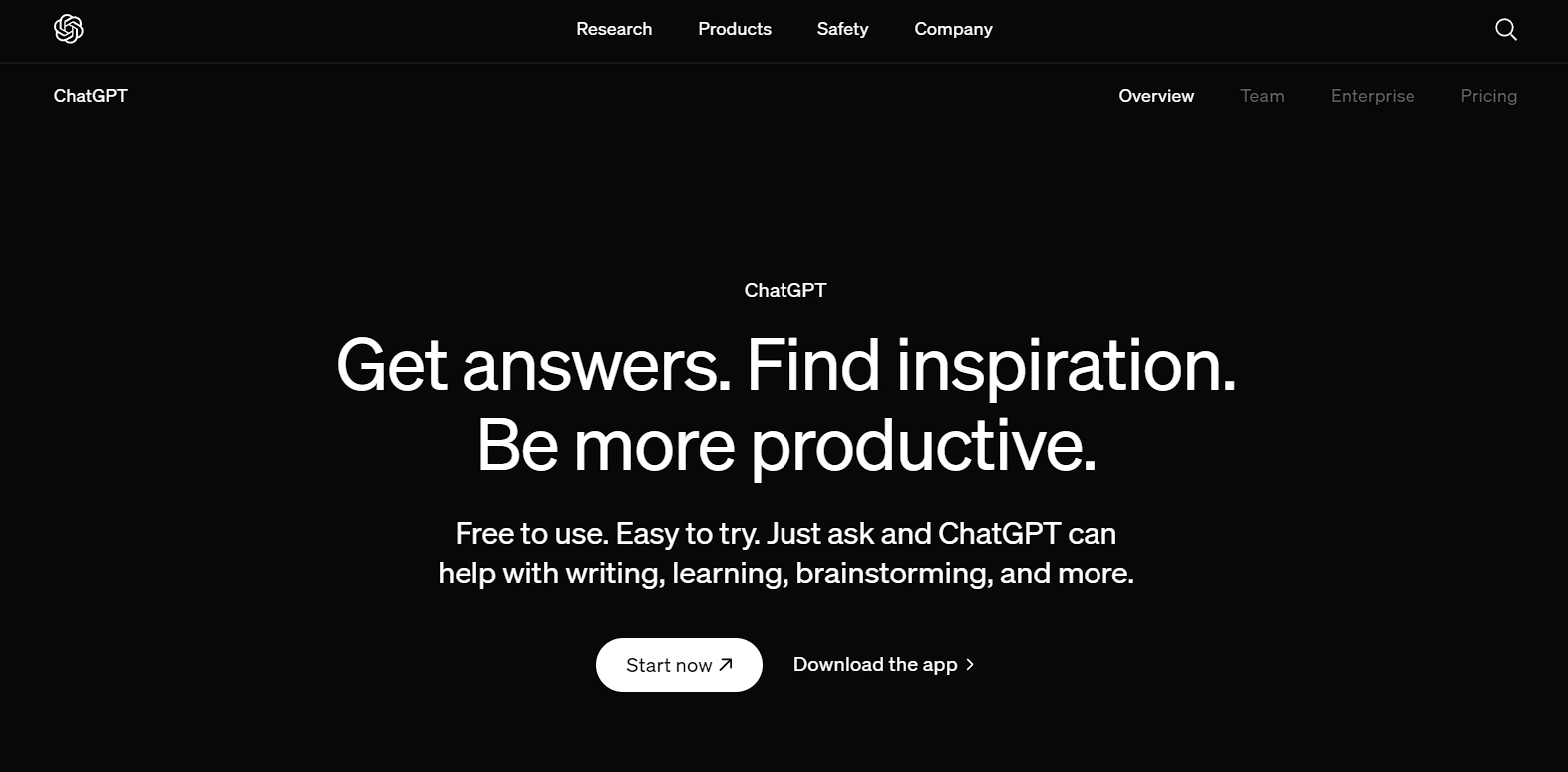
ChatGPT is an AI that can help with everyday tasks. It’s like a smart assistant that can help you come up with ideas, create outlines, and even explain complicated concepts in simpler terms. ChatGPT has a huge amount of knowledge that it can share with you, which can be really helpful when you’re trying to learn about a new topic. You can ask it questions, and it will give you answers and suggestions to help you get started.
One of the best things about ChatGPT is that it can help you when you get stuck. If you’re having trouble thinking of what to write, you can ask ChatGPT for ideas or ask it to expand on a specific point. It can also help you make your writing clearer and easier to understand. But it’s really important to remember that ChatGPT is just a tool, and you should always do your own research and thinking. You need to make sure that the information it gives you is correct and use it as a starting point for your own investigation. Don’t just copy what it says – use it to help you learn and come up with your own ideas.
Reasons to buy:
- Versatile AI assistant for various aspects of the research process
- Helps overcome writer’s block and generates new ideas
- Can explain complex concepts in simpler terms
- Assists with outlining and structuring research papers
- Available 24/7 for instant assistance
- Continuously updated with new information and capabilities
Reasons to avoid:
- Not specifically designed for academic research or writing
- May provide inaccurate or outdated information
- Cannot access or analyze current research databases
- Lacks the ability to cite sources or provide bibliographies
- Potential for inadvertent plagiarism if used improperly
- May not always understand highly specialized academic jargon
Tool features:
- Natural language processing for human-like interactions
- Ability to generate text on a wide range of topics
- Context retention for ongoing conversations
- Multi-language support
- Can be integrated into various applications and platforms
- Regular updates to improve performance and expand knowledge base
Pricing:
- ChatGPT (basic version): Free
- ChatGPT Plus: $20/month
- API access: Varies based on usage (pay-per-token model)
Ready to transform your writing experience?
Sign up for Blainy today and start writing your papers with confidence!
Benefits of using AI tools for research
- Time-saving: Automates repetitive tasks, freeing up researchers for critical thinking
- Enhanced data analysis: Quickly processes large datasets to uncover patterns and insights
- Improved writing quality: Offers grammar, style, and structural suggestions
- Literature review assistance: Rapidly summarizes and synthesizes existing research
- Idea generation: Helps brainstorm new research directions and hypotheses
- Collaboration support: Facilitates teamwork through shared platforms and real-time editing
- Increased productivity: Streamlines workflow and accelerates research output
- Error reduction: Minimizes human errors in data analysis and citation
- Accessibility: Democratizes access to advanced research capabilities
- Interdisciplinary insights: Identifies connections across different fields of study
- Continuous learning: Provides ongoing feedback to improve research skills
- Up-to-date knowledge: Helps researchers stay current with rapidly evolving fields
Final thoughts
AI tools are changing the way we write research papers. They can help us work faster and come up with new ideas. But it’s really important to remember that these tools are just helpers, not substitutes for our own thinking and expertise.
We should use these tools to help us, not do the work for us. As AI get smarter, people who learn to use them wisely will have an advantage in doing great research.
The future of writing and research is exciting, and it’s all about combining the best of human thinking with the power of AI.
Frequently asked questions
How do I use AI for academic writing?
To use AI for academic writing, start by selecting a suitable tool for your needs. Use AI to assist with literature reviews, generate outlines, improve grammar and style, and check citations. Input your research questions or topics, and let the AI suggest relevant sources or ideas. Always review and refine the AI-generated content to ensure accuracy and originality. Remember to use AI as a complement to your own knowledge and critical thinking, not a replacement.
What are the pros and cons of using AI tools for academic writing?
Pros:
- Time-saving and increased productivity
- Improved writing quality and consistency
- Access to vast databases of information
- Assistance with idea generation and research directions
- Help with formatting and citations
Cons:
- Potential for over-reliance on AI-generated content
- Risk of plagiarism if not properly cited or reviewed
- Possible lack of depth or nuance in AI-generated ideas
- Privacy concerns with data input into AI systems
- Learning curve and cost associated with some AI tools
Which is the best AI tool for writing research papers in 2024?
Blainy is the best AI tool for research paper writing in 2024. It uses NLP to analyze articles, to help researchers write better papers. Blainy can review books and articles, manage citations, and give writing tips. It understands difficult topics and helps create clear, well-organized content. While you still need to check its work, Blainy is easy to use and very helpful. This makes it a top choice for anyone needing AI help with academic writing.


